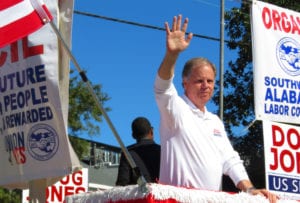WASHINGTON, D.C. — You would have to go back to the 1920s and early ’30s to find a President of the United States willing to fight trade wars with other countries and express hostility to international trade agreements as Donald Trump seems intent on doing, it seems for domestic political points on the advice of Uber nationalist Steve Bannon rather than actual benefits for American workers or U.S. manufacturing.

U.S. Senate candidate Doug Jones rides with organized labor in the Veterans Day Parade in Mobile, Alabama, Friday Nov. 10, 2017: Photo by Glynn Wilson
According to information readily available online, the last American attempt to fight a trade war to protect American jobs didn’t turn out so well.
According to Patrick Gillespie, an economics reporter, America’s last trade war exacerbated the Great Depression in the 1930s, when unemployment rose to 25 percent. Claiming it was protecting American jobs, Congress passed the Smoot-Hawley Act in 1930. The original bill was meant to protect farmers. But to build political support, many lawmakers asked for tariffs — or taxes — on all sorts of goods in exchange for their vote.
Several nations, including Canada, slapped steep tariffs on U.S. goods shipped and sold abroad. As a result, U.S. imports fell 40 percent in two years. U.S. exports of eggs to Canada fell to 7,900 in 1932 from 919,000 in 1929, according to Doug Irwin, a Dartmouth professor and former trade adviser to President Reagan.
“Banks shuttered. Unemployment shot up,” he said. “Surely, there were a litany of factors at play. But economists widely agree Smoot-Hawley made the Great Depression much worse…”
Senators Send Letter
In response to the Commerce Department’s announcement of an investigation under Section 232 of the Trade Expansion Act of 1962 into whether the importation of automobiles and parts into the United States threatens national security — and to try to get the attention of the Trump administration about the potential harmful affects of tariffs on American jobs and manufacturing partnerships with other countries especially in states like Alabama and Tennessee where automobile manufacturing are now key lynchpins in the growing economy — U.S. Senators Doug Jones, the new Alabama Democrat, and Lamar Alexander, a Republican from Tennessee, just sent a letter to U.S. Department of Commerce Secretary Wilbur Ross. In it they urge his agency and the administration to reconsider a proposed 25-percent tariff on imported cars, trucks, SUVs and auto parts, a move recently proposed by President Trump.
The letter argues that rather than helping the economy or improving national security, the tariffs will cost jobs and threaten the growth of the automotive manufacturing sector, especially in the Southeast. Auto manufacturers and suppliers employ nearly 200,000 workers in Alabama and Tennessee, a number that was expected to continuing growing, before the administration began monkeying around with international trade agreements.
“These are good jobs employing American workers,” the Senators say in their bipartisan letter. “Over the past several years the automotive industry, including foreign manufacturers, has invested billions in our states and created thousands of jobs. We share with you and President Trump the goal of bolstering our nation’s security and making sure that our trade policy is balanced and works for American workers and businesses.”
But they express concern that tariffs on the automotive industry will “serve neither of these purposes,” and instead could “put hundreds of thousands of American jobs at risk including many in our home states.”
As a result of the so-called investigation, automotive companies are currently facing the threat of direct and retaliatory tariffs, which could mean hundreds of millions of dollars of additional costs.
“To absorb these costs, automotive companies in our state could be forced to either raise prices or cut costs,” the Senators write. “Either scenario directly translates into lost jobs for our constituents.”
Since the administration’s 232 investigation centers on the national security impact of the domestic automotive industry in the United States, the Senators say reducing the size of the automotive manufacturing base “will not bolster our nation’s security.”
“We hope you will take into consideration the vital role the automotive industry plays in our states and the well-being of the tens of thousands of American workers who rely on this sector to make ends meet,” the letter concludes.
In a conference call with reporters on Thursday, Senator Jones admitted that he has been hesitant to openly criticize the president and the administration thus far, having been sworn in just six months ago in January. But he said these mini-tariffs proposed by the administration “are vey concerning to me.”
“The impact of these tariffs have the potential to have a devastating effect on the Alabama economy and the jobs this industry has created in recent years,” he said.
Nearly 40,000 jobs have been created in Alabama alone, he said, since Mercedes first opened a plant in Vance near Tuscaloosa in the 1990s. Since then, Honda opened a plant in Lincoln, followed by Hyundai in Montgomery and Toyota in Huntsville.
Some of these cars and trucks manufactured in Alabama are exported abroad, he said, having a $7.75 billion economic impact.
“That is a huge export,” he said. “Alabama is now the third largest auto exporter in the country behind Michigan and South Carolina.”
The numbers don’t include the new Toyota-Mazda plant recently announced, which would add another 4,000 jobs and $1.6 billion in economic development, something that was mentioned in President Trump’s State of the Union address.
“That was a nice moment for the state,” Jones said. “But I wanted to raise this today to remind the president of those comments and his commitment to bring manufacturing back to the United States.”
Jones said he supports the president’s commitment to also expand manufacturing already taking place in the U.S. as well.
“But hurting current Alabama employers is not the way to do it,” he said. “On top of the threat to the economy, the tariffs will have unintended consequences of being passed onto the consumer.”
Tariffs like this are simply a tax on the consuming public, he said.
The effect could mean direct retaliatory tariffs and millions in unnecessary costs that will be passed on to consumers in the form of higher prices or to workers in the form of job cuts, he said.
“The auto manufacturing industry has become one of the leading job creators in our state so I can’t just sit by while the president’s shorted-sighted proposals threaten good jobs across Alabama,” Senator Jones said. “I’m urging him to reconsider going down this path. The proposal is going to hurt Alabama, plain and simple.”
In response to questions, Jones said the Trump trade war talk is more about domestic politics than smart economics.
“In all candor it seems to me to be a lot of political messaging leading up to the midterms,” Jones said. “If history is any judge, they are going to walk back a lot of these things. But what troubles me is that they are going to hold a lot of American jobs hostage in doing this, and I don’t think that’s appropriate. There are other ways to do it.”
Just by announcing such a potential move has affects on the markets, he said, and it has the potential to freeze the automotive industry because they don’t know whether to expand or layoff workers. Consumers may not buy cars wondering about the impact on prices.
“The bottom line is I am as mystified as everyone else as to how the automotive industry is affecting national security at this point,” he said. “And it has yet to be explained by the administration.”
Jones said he has talked to auto company executives about the potential impacts.
“They believe this could cost a lot of jobs in Alabama,” he said. “The increased cost is going to cause less demand. I mean it’s simple economics. They are looking to expand their industries. But at this point it is hard to gauge.”
By tossing out this proposal basically in a Twitter tweet just makes it hard for companies to plan and it impacts the markets in unintended ways, he said.
And while it might seem like it would not have an impact on vehicles manufactured in the U.S., since the proposal is a tariff on imports from abroad, it affects the bottom line of the companies in Japan and Germany and would apply to many of the engines and other parts that are imported for cars and trucks being assembled in Alabama, Tennessee and other states.
“We are punishing those companies and we seem to be punishing our friends,” he said. “If it was a national security issue we wouldn’t need to be punishing our friends (allies) who are not cheating. It just doesn’t make a whole lot of sense.”
In response to a related question, Jones said there is a lot of “befuddlement” on the part of Republicans and Democrats and industry executives on where this administration is going with these wild proposals “because it really is not a political issue. It is an issue about jobs and the economic growth of our states. There is a lot of concern because it doesn’t make a lot of sense with the president’s ‘pro-growth’ strategy.”
In a related question I raised, there has not been much said or reported in Alabama or elsewhere about the negative impact on the economy and the loss of jobs from Trump’s unilateral decision to pull out of the international nuclear disarmament deal with Iran, which could result in the loss of trade with Iran and jobs at the Airbus plant in Mobile. After the trade embargo was lifted by the Obama administration, Iran signed a contract to buy planes from Airbus.
“We’ve got real concerns about pulling out of the Iran nuclear deal for a lot of reasons, including the security of the Middle East and the Unites States,” Jones said. “It does affect a lot of companies and could have an affect on Airbus as well.”
Jones said the people out in the state and country should be paying to attention to what’s going on in Washington on these issues.
“This is more than just a nationalism type approach and getting a better deal,” Jones said. “This is about things that are going to directly affect jobs and American families.”
He said if you look at Trump’s history on proposing these tariffs, this president “tends to start throwing these messages out there and it affects the industry, it affects people, it gives cause for concern. Then they start walking it back. That’s just not a good way to run the country or run the economy.”














Reader Supported News - No Paywall, Google Ads, Popup Ads, Sponsored Content or A.I. - Support American Journalism with GoFundMe
Where is Richard Shelby on this??
Reader Supported News - No Paywall, Google Ads, Popup Ads, Sponsored Content or A.I. - Support American Journalism with GoFundMe
Napping in his rocking chair on Lake Shelby, no doubt.